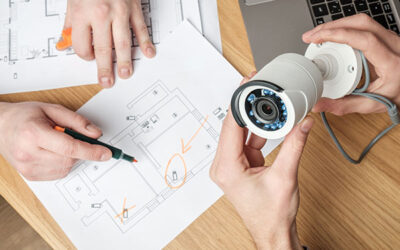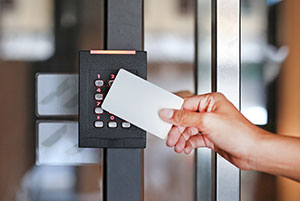While there are lots of ways to secure your property, such as with security cameras and alarm systems, a security guard both consolidates and enhances these measures. Not only do they increase the deterrent aspect, with their presence helping to prevent many crimes in the first place, but they can help you pinpoint precisely where an incident is taking place. As a result, you can respond to events like break-ins much faster and significantly lessen their impact.
In this post, we investigate 12 commonly referred to types of security guards, their differences and similarities, and the role each plays in securing your business or property.
What Are the Types of Security Guards and Their Roles?
Here are the 12 types of security guards we’ll be looking at in this post.
- Business guards
- Residential guards
- In-house guards
- Stationary guards
- Patrol guards
- Event security guards
- Government security guards
- Uniformed guards
- Plainclothes guards
- Unarmed guards
- Armed guards
- Personal guards
Before we dive in, it’s key to take note that there’s a lot of crossovers between the different kinds of security guards. For instance, all these guards will wear a uniform or be plain-clothed, as well as armed or unarmed.
Now let’s look at each type of security guard, in turn, in greater detail.
Business Guards
Business guards, also known as Static Guards; operate within a professional or corporate setting and are there to protect a business’ assets and its employees. Because businesses vary greatly in size, scope, and function, the roles and responsibilities of a business guard can differ – and the term “business guard” covers a lot of ground.
While some business guards are tasked with protecting smaller companies like retail stores, small office buildings or bars, others surveil large business premises comprising several buildings. Subsequently, while smaller businesses only need a single security guard, other, larger organizations will require several business guards, often working in shifts to always protect the property.
As well as the standard training that security guards undergo, a business guard will also usually receive specialized training in line with the company’s needs. For instance, if a business has warehouses, its security guard will be trained in safety protocols and how to enforce them. However, speaking more generally, as business guards must consistently deal with employees, external suppliers and, visiting customers, they’ll usually receive customer service training as well.
Residential Guards
A residential guard’s job is to protect the residents and homes, within a residential property complex. You’ll typically find a residential guard in a gated community or an apartment block. In addition to being tasked with a whole building or neighbourhood, an individual could hire a residential guard to protect their private residence (which could also be considered a personal guard). These guards are also classified as Static Guards.
A residential guard’s main responsibility is to patrol the community they work in and keep a lookout for suspicious activity. They’re also often the first port of call if a resident sees something that causes them alarm. This is especially helpful in cases where a resident might not quite feel they should call the police but know they have security guards they can inform.
Another important function carried out by resident guards is access control: determining who comes in and out. In apartment blocks, a residential guard is usually stationed on the ground floor while being positioned at the gate. This is a vital deterrent for criminal activity as by preventing would-be criminals from gaining access to the residential community, they can prevent crimes from happening in the first place. Similarly, burglars looking at the residence as a lucrative opportunity will see the security guards and likely think better of it. Also, if a resident loses their keys and/or access pass, the guard will be able to confirm their identity and allow them to enter their home.
In-house Security Guards
An in-house, or proprietary, security guard is employed directly by a business, instead of working for, and being supplied by, a professional security company. As they’re on a company’s payroll, their employer usually invests in in-house security guards more than those supplied to them by a professional security company. Subsequently, they’re usually taught additional skills specific to their role, which allows a company to customize the skill set of their security personnel.
The downside to hiring an in-house guard, on the other hand, is that you’re responsible for training them. And if no one at your company knows about security protocols and security equipment, attempting to train the security guard will be a time-consuming and frustrating process. And, ultimately, they won’t end up being as effective in their role as they should.
To this end, in-house guards are often trained, or retired, security guards (or former police or military personnel) and can hit the ground running. All they need to learn is the particulars of the company they’ve been employed by.
Stationary Guards
A stationary guard stays in a particular spot for the entirety of their shift. Subsequently, they tend to have a specific task to carry out and are required to stay focused on it. Perhaps the best example of stationary guards is the stoic, red-and-black-clad, royal guards that are famously positioned outside Buckingham Palace and other London landmarks. But a more common, and admittedly less glamorous, example of a stationary guard is a car park attendant.
Stationary guards are usually posted at multiple, specific points around a site. These positions are picked strategically so each guard can see the others. Another common function of a stationary guard is being stationed in a monitoring control room so they can surveil all of the footage captured by security cameras.
Patrol Guards
In contrast to stationary guards, patrol guards move throughout their assigned area during their shift.
For some patrol guards, this area could have a 100-metre radius, while for others, it could be a huge area that they can only cover once or twice a shift. Subsequently, some security guards will patrol their area on foot, while others will require a vehicle, such as a bicycle, scooter, car, or maybe even a Segway!
Some patrol guards are instructed to repeat the same patrol repeatedly throughout their shift, while others will be required to vary their patrol so that any would-be criminals observing the premises don’t detect a routine that they can work around.
Event Security Guards
Event security guards work at large gatherings with many people in attendance. This includes sports events, concerts, festivals, fairs, carnivals, and other large, public events. With lots of people in attendance, the event organizers will need lots of security spread out across the venue, so it’s customary to hire dozens, or even hundreds, of event security personnel, depending on the size of the event and the potential hazards. These guards are also known as crowd controllers.
One of an event security guard’s most important roles is crowd control. They need to keep attendees moving, make sure they stay in certain areas, and don’t gain access to certain areas. Event security guards need to be able to work well in a team and know how to escalate a situation in the case of an emergency. In many cases, some will have basic first aid training to help people in a medical situation, while they’re waiting for emergency services to arrive.
Event security guards are employed by professional security firms, so they’ll work at a variety of different events in many areas, which makes them especially adaptable. Additionally, some will have downtime between events, so they’ll work as security guards for other businesses to fill in the time.
Government Security Guards
Government security guards are tasked with maintaining the security of local, state, or federal government buildings – and the employees within them. This includes sites that immediately come to mind when you think of government buildings, like parliamentary buildings, courthouses, and governmental offices, as well as post offices, airports, nuclear power stations, and other vital infrastructure.
Because security at government facilities is of the highest priority, becoming a government security guard is more difficult than other positions featured in this post. Government security guards must receive special security clearance, which requires being thoroughly vetted. They also must be well-training, which will also include specialist training particular to the site to which they’re assigned.
Uniformed Guards
A uniformed guard is a catch-all term that applies to many of the other guards described in this post. They offer an immediate benefit in that they offer a measure of effectiveness without having to do anything! Like a well-positioned security camera, security alarm, or even an “area under surveillance” sticker, the mere presence of a security guard in uniform is often enough of a deterrent to potential burglars, trespassers and other criminals.
Plus, those inside the site will feel safer and secure at having a security professional in uniform around – even if only on a subconscious level. Similarly, because of the natural association between a uniform and authority, a uniformed guard is more likely to get visitors, such as customers and suppliers, to comply with their instructions.
Plainclothes Guards
A plainclothes guard is the opposite of a uniformed guard – and is designed not to stand out. Now, with the deterrent aspect of a security guard, you may wonder why you’d hire a plainclothes guard, but there are a few reasons why you may choose to do so.
The first scenario is where a uniformed officer could cause distress or make people uncomfortable. This could include a wedding or party held by a high-net-worth individual. Security may be necessary, but a uniformed guard would look out of place and undue attention. Similarly, someone may attend a special event and require protection but would instruct their personal guards to wear plain clothes to blend in and not draw attention to the person.
Plainclothes guards are also a good fit for businesses that need security but don’t want the image of a uniformed officer. A high-end store is a good example of this, as the owners may use a plainclothes security guard to diminish the store’s ambience and prevent its patrons from feeling uneasy.
Unarmed Guards
This is the most common type of security guard and applies to most of the other guards on this list. Unless a security guard is positioned in a high violence area or protects particularly valuable assets, there’s little cause for them to be armed.
Also, importantly, “unarmed” does not mean they have no means to protect themselves whatsoever.: unarmed guards are usually equipped with a baton and/or pepper spray. Plus, unarmed guards still need to be able to restrain a criminal, if the need arises, so they usually have handcuffs too.
Armed Guards
Sites with a higher security threat may require armed guards. Armed guards offer usually enhanced physical defence in the event of an incident in which the criminals carry lethal weapons. Prominent examples of this are government-owned buildings, namely parliament houses and airports, which may be targets for the most dangerous and resourceful criminals – and which a response needs to be swift and decisive. Naturally, armed guards require extra training and experience than most other security guards, so they’re more expensive to hire.
Another situation that often requires armed guards is when a business needs to protect high-value assets. The more valuable the item, the more tempting they’ll be for criminals – and the more ambitious and skilled those criminals are likely to be. Worse, the more likely it is that the criminals will also be armed in pursuit of the asset. Consequently, an armed guard is a response in kind and communicates, to even the most daring of criminals, that the risks of attempting to steal the asset are very high.
Personal Guards
A personal guard is also commonly referred to as a bodyguard and is assigned to ensure the safety of a particular individual. A personal guard is a highly specialized position which requires extensive training and, more importantly, experience. Consequently, a personal guard is likely to have spent time in the police or military. This results in them costing considerably more than other types of security guards, which is why they’re usually reserved for celebrities, high-net-worth individuals, and high-ranking executives and government officials.
If you’re thinking of hiring security guards, it’s important to choose the type that matches the needs of your business or property. To that end, we hope this post has helped you understand the types of security guards available to you and the benefits that each offers.
To better hone in on the exact security patrolling requirements that would be best for you, we can provide a free, onsite inspection to determine which best practices to put in place. To arrange your inspection – or for any other questions or queries regarding security guards – get in touch and we’ll be thrilled to help.




